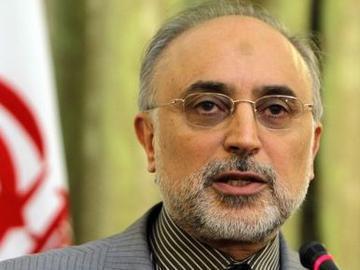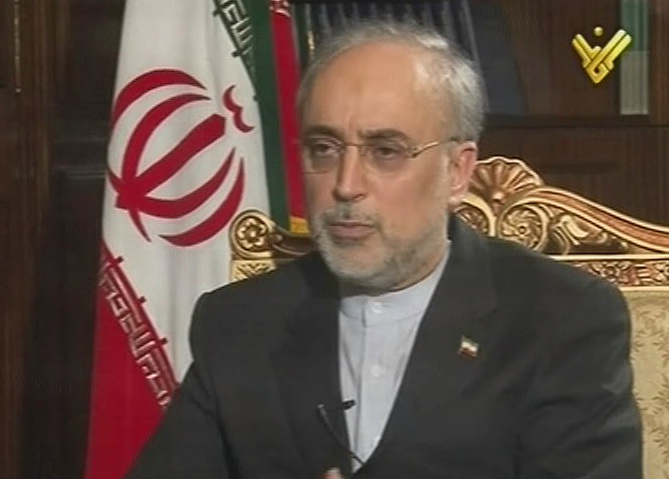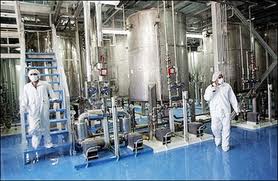Iran has called on the West to look to lifting its sanctions if it wants to quickly resolve the showdown over Tehran’s nuclear activities, a prospect swiftly ruled out by Washington.
 Iranian Foreign Minister Ali Akbar Salehi outlined his country's message in an interview with the news agency ISNA on Monday, following milestone talks at the weekend in Istanbul between Iran and world powers.
Iranian Foreign Minister Ali Akbar Salehi outlined his country's message in an interview with the news agency ISNA on Monday, following milestone talks at the weekend in Istanbul between Iran and world powers.
The talks, described by both sides as an encouraging revival of a process that had been suspended for 15 months, are now due to be developed in another round on May 23 in Baghdad.
"If the West wants to build trust, it should begin with sanctions, because it can help speed up the talks reaching a solution," Salehi was quoted as saying, AFP news agency reported.
"If goodwill (from the West) is present... we are ready to rapidly and easily, and even in the Baghdad meeting, resolve all issues" regarding Iran's nuclear program, he said.
Earlier on Sunday, Salehi noted during an interview with the Iranian TV, Ja’am-e Jam, that the West has come to realize that Iran will continue its activities irrespective of the extent of pressures exerted on that country.
However, he appeared to suggest that the level of enrichment could be up for discussion, while pointing out that the Islamic Republic is seriously against the proliferation of nuclear weapons throughout the world.
US Reaction
US Secretary of State Hillary Clinton, during a trip to Brazil Monday, insisted that the "burden of action" is with Iran to prove it is serious in nuclear talks, dismissing Tehran's appeals for world powers to ease sanctions first.
"The burden of action falls on the Iranians to demonstrate their seriousness and we're going to keep the sanctions in place and the pressure on Iran" as Tehran prepares for the talks in Baghdad next month, Clinton said in Brasilia, following the talks at the weekend in Istanbul between Iran on one hand and the United States, China, Russia, France, Britain and Germany on the other.
 For his part, Salehi noted that any decision concerning holding talks with the US lied within the authorities of the Supreme Leader of the Islamic Revolution Grand Ayatollah Sayyed Ali Khamenei, referring to the fact that Iran will not engage in diplomatic dialogue with the US.
For his part, Salehi noted that any decision concerning holding talks with the US lied within the authorities of the Supreme Leader of the Islamic Revolution Grand Ayatollah Sayyed Ali Khamenei, referring to the fact that Iran will not engage in diplomatic dialogue with the US.
“It is the leader who determines what Iran should do,” he added.
While Iran's negotiators will take the position in Baghdad that producing 20 percent enriched uranium "is our right," foreign minister Salehi said, if the world powers "guarantee they will provide us with fuel of various purities, it will change the perspective."
Iran currently enriches uranium to 3.5 percent and to 20 percent. The former it says is to power its Bushehr nuclear electricity plant and the latter it says is to generate medical isotopes in its Tehran research reactor.
Uranium has to be enriched to 90 percent or above for use in an atomic bomb.
According to the time schedule, the United States and the European Union are due to fully implement economic sanctions the beginning of next July – which they have already started -- unless some sort of breakthrough is made in the talks.
Russia's Foreign Minister Sergei Lavrov, however, said in a statement Monday that Moscow does not back increasing "sanction pressure" on Tehran.
He also slammed as "counterproductive and dangerous any attempts to use reports of Iran's nuclear technology progress to artificially whip up tensions around Iran and create an excuse for further build-up of sanction pressure."
The Islamic Republic of Iran and the G5+1 have agreed Sunday to continue their second round of talks in Baghdad on May 23, after having ended the first round in Istanbul Saturday.
Salehi declared that Iran is ready to solve all nuclear issues in Baghdad meeting in case sanctions are to be cancelled.
Salehi noted that major states - with which Tehran has resumed dialogue in Istanbul - “have realized that they cannot ignore the fact that Iran masters the uranium enrichment and will not give up this right."
